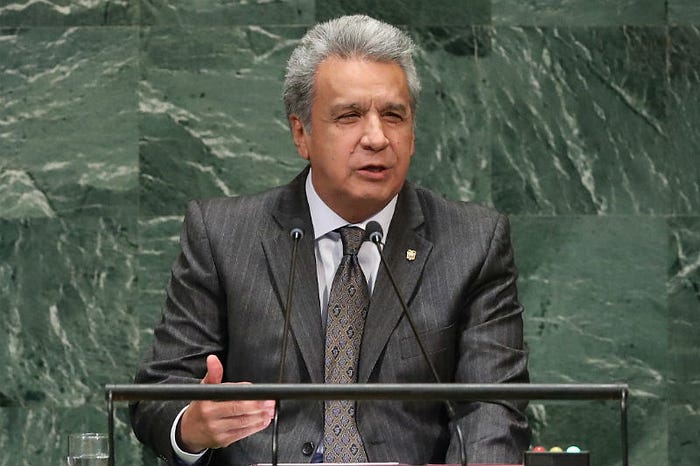Assange and Ecuador’s ‘traitor’ president

Ecuadoreans have a popular expression, hacer la casita (literally, ‘make the little house’); roughly it means, ‘they deceived us by promising something that was not going to be fulfilled’. This is what the majority of Ecuadoreans are feeling now about president Lenín Moreno.
Moreno, whose first two years in power will be marked in May, has been busy dismantling former president Rafael Correa’s ‘Citizens’ Revolution’ — the socially radical movement that brought to Ecuador political and institutional stability and economic progress. Atilio Borón, a sociologist and political analyst, described Moreno’s abandonment of the Citizens’ Revolution as ‘electoral fraud’ and ‘an embezzlement of the trust placed on him by the citizenship’.
Moreno, who served as vice president between 2007 and 2013 under Correa, has suffered a gradual erosion of popularity, due to the fact that the majority of Ecuadorians perceive that his time as president has yielded few results. On 16 April we saw the latest in a long list of street demonstrations against his administration; a protest against his tightening of economic measures, the sacking of thousands of workers, and the withdrawal of the asylum granted to Julian Assange by Correa.
After the arrest of Assange, Correa described Moreno as ‘the greatest traitor in Ecuadorian and Latin American history’. The decision, Correa said, was motivated by ‘personal revenge’ after WikiLeaks published the INA Papers corruption case in which Moreno’s family was involved.
At the close of 2018, only 37 per cent of Ecuadorians approved Moreno’s management — a long drop from 77 per cent in 2017, the year Moreno first took up residence at Carondelet Palace, Ecuador’s government house. Different Ecuadoran surveys have registered that 70 per cent of respondents regretted having given their vote to Moreno. A survey by Ecuador’s Perfiles de Opinión (Profile of Opinions) — a public opinion polling firm — revealed that 80 per cent of respondents believed the government is on ‘the wrong path’.
One of the fundamental causes of Moreno’s unpopularity is his brisk swing to the right. It was not until April 2018, 11 months after his administration began, that he presented his economic program, which is in fact an austerity plan aimed, among other things, at reducing the size of the state and granting tax amnesty to debtors of the treasury, especially large economic groups.
Moreno’s handing over of the economy to the right became visible with the appointment in 2018 of businessman Richard Martinez as Minister of Economy and Finance. Martinez, former president of the Ecuadorean Business Committee, has been a staunch opponent of redistributive policies and higher taxes for the wealthiest Ecuadoreans.
Twenty-five of every 100 Ecuadorians are poor, and almost one in ten is living in extreme poverty on less than US$50 a month. The economy suffered a significant deceleration during 2018: according to a report of the Economic Commission for Latin America and the Caribbean, there is a projected growth of only one per cent, compared to 2.4 per cent in the previous year.
Moreno’s anti-corruption campaign — one of his 2017 election promises — has gone silent. And no wonder — two scandals that point directly to Moreno have been revealed in the last few months. According to El Telégrafo, Ecuador’s oldest and most prestigious newspaper, scandals involving the management of public resources have been a constant over the last two years.
Under Correa, Ecuador was solidly engaged with Latin American progressive governments, such as Venezuela under Chavez and Bolivia under Evo Morales. Yet Moreno has begun realignment with some of the most reactionary governments in the region: Macri in Argentina, the proto-fascist Jair Bolsonaro in Brazil, Chile’s right-wing tycoon Sebastián Piñera, and Donald Trump in the US. This culminated in the departure of Ecuador from the Bolivarian Alliance for the Peoples of Our America, promoted by Hugo Chávez and Fidel Castro at the end of 2004.
The first big street protest against Moreno took place in April 2018. Since then they have become larger and more frequent. Protestors have demanded the president maintain the plan presented during the electoral campaign that took him to the presidency in 2017, which promised a continuation of the Citizens’ Revolution.
During the 16 April protests, Fernando Ibarra, president of the Ecuadorian Confederation of Workers Unitary Class Organizations, warned Moreno against the privatisation of state companies and argued ‘for the defence of labour stability for public workers’. Many of the protestors wore masks of Julian Assange, who became an Ecuadorian citizen in 2017 and now languishes at Belmarsh prison in southeast London.
Originally published at https://www.eurekastreet.com.au.
